Maksim Cikuli (born 7 January 1952) was the Minister of Health of Albania [1] two times. His most recent term of office was from September 2005 until March 2007.
Cikuli is a doctor who has specialized in genetics.
Maksim Cikuli (born 7 January 1952) was the Minister of Health of Albania [1] two times. His most recent term of office was from September 2005 until March 2007.
Cikuli is a doctor who has specialized in genetics.

Albania, officially the Republic of Albania, is a country in Southeast Europe. The country is located in the Balkans on the Adriatic and Ionian Seas within the Mediterranean Sea and shares land borders with Montenegro to the northwest, Kosovo to the northeast, North Macedonia to the east and Greece to the south. Spanning an area of 28,748 km2 (11,100 sq mi), it displays a varied range of climatic, geological, hydrological and morphological conditions. The country's landscapes range from rugged snow-capped mountains in the Albanian Alps and the Korab, Skanderbeg, Pindus and Ceraunian Mountains, to fertile lowland plains extending from the coasts of the Adriatic and Ionian seas. Tirana is the capital and largest city in the country, followed by Durrës, Vlorë, and Shkodër.
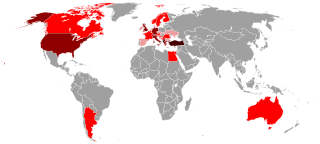
The Albanians are an ethnic group native to the Balkan Peninsula who share a common Albanian ancestry, culture, history and language. They primarily live in Albania, Kosovo, North Macedonia, Montenegro, Serbia as well as in Croatia, Greece, Italy and Turkey. They also constitute a large diaspora with several communities established across Europe, the Americas and Oceania.

The Balkans, corresponding partially with the Balkan Peninsula, is a geographical area in southeastern Europe with various geographical and historical definitions. The region takes its name from the Balkan Mountains that stretch throughout the whole of Bulgaria. The Balkan Peninsula is bordered by the Adriatic Sea in the northwest, the Ionian Sea in the southwest, the Aegean Sea in the south, the Turkish straits in the east, and the Black Sea in the northeast. The northern border of the peninsula is variously defined. The highest point of the Balkans is Musala, 2,925 metres (9,596 ft), in the Rila mountain range, Bulgaria.
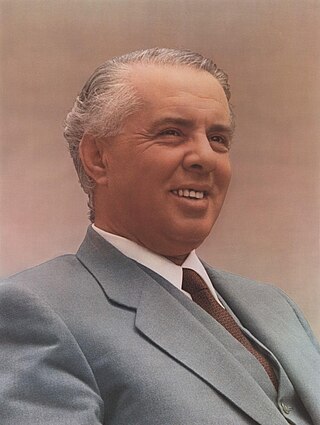
Enver Hoxha was an Albanian Communist politician who was the dictator of Albania from 1944 until his death in 1985. He was First Secretary of the Party of Labour of Albania from 1941 until his death, a member of its Politburo, chairman of the Democratic Front of Albania, and commander-in-chief of the Albanian People's Army. He was the twenty-second prime minister of Albania from 1944 to 1954 and at various times was both foreign minister and defence minister of the country.

The Kosovo War was an armed conflict in Kosovo that lasted from 28 February 1998 until 11 June 1999. It was fought between the forces of the Federal Republic of Yugoslavia, which controlled Kosovo before the war, and the Kosovo Albanian rebel group known as the Kosovo Liberation Army (KLA). The conflict ended when the North Atlantic Treaty Organization (NATO) intervened by beginning air strikes in March 1999 which resulted in Yugoslav forces withdrawing from Kosovo.

Kosovo, officially the Republic of Kosovo, is a country in Southeast Europe with partial diplomatic recognition. Kosovo lies landlocked in the centre of the Balkans, bordered by Serbia to the north and east, North Macedonia to the southeast, Albania to the southwest, and Montenegro to the west. Most of central Kosovo is dominated by the vast plains and fields of Metohija and the Kosovo field. The Accursed Mountains and Šar Mountains rise in the southwest and southeast, respectively. Its capital and largest city is Pristina.

Tirana is the capital and largest city of Albania. It is located in the centre of the country, enclosed by mountains and hills with Dajti rising to the east and a slight valley to the northwest overlooking the Adriatic Sea in the distance. It is among the wettest and sunniest cities in Europe, with 2,544 hours of sun per year.
The foreign relations of Albania are its relations with other governments and peoples. Foreign relations are conducted through the Ministry of Foreign Affairs in Tirana. The current minister is Olta Xhaçka. The current Ambassador to the United Nations is Ferit Hoxha.
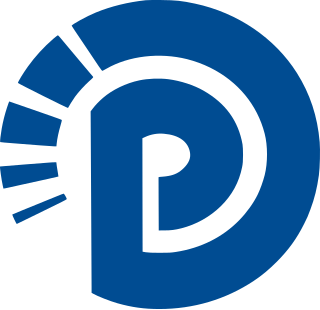
The Democratic Party of Albania is a conservative political party in Albania. It has been the largest opposition party in the country since 2013.

Football Club Dinamo Tirana, commonly referred to as Dinamo Tirana and colloquially known as Dinamo, is an Albanian professional football club based in Tirana. They play in the Kategoria Superiore, the first tier of Albanian football, in the 2023–24 season. Founded in 1950 during the communist regime, the club was historically affiliated to the Interior Ministry and having won 18 National Championships, it is considered to be the second most decorated club after local rivals KF Tirana.
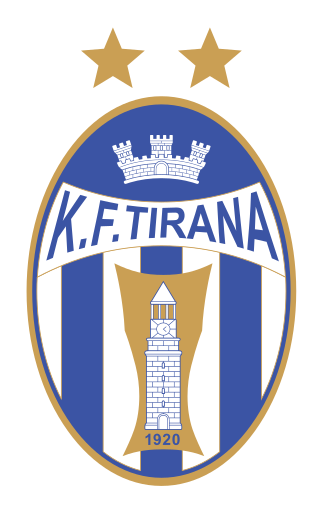
Klubi i Futbollit Tirana is an Albanian professional football club based in the country's capital city, Tirana. The men's football club is part of the multi-disciplinary sports club SK Tirana, and is the most successful in Albania, having won 54 recognized major domestic trophies. They are the only football club in Albania with two stars in their crest after winning the 20th championship in 2003, each star corresponds to ten championships. Making them the first and only Albanian club to have achieved such a feat. They play their home games at the Selman Stërmasi Stadium in Tirana and they play in the Kategoria Superiore.
Sport in Albania revolves mostly around team sports, such as football, basketball, volleyball and handball. Other sports includes boxing, weightlifting, tennis, swimming, judo, karate, athletics, table tennis, rugby, cricket, and chess. Football in particular has seen a rapid transformation, with the Albania national football team making its debut at the 1964 UEFA European Football Championship. The national football team also qualified for the 2016 UEFA European Football Championship. Many Albanian athletes have also achieved significant success and have won European and Mediterranean titles in numerous sports during the years, such as wrestling, football, athletics and weightlifting. Albanian athletes have won a total 49 medals for Albania in 8 different Mediterranean sports. Albania has had some success in others sport such as volleyball and basketball as well.
Albanian mafia or Albanian organized crime are the general terms used for criminal organizations based in Albania or composed of ethnic Albanians. Albanian organized crime is active in Europe, North America, South America, and various other parts of the world including the Middle East and Asia. The Albanian Mafia participates in a diverse range of criminal enterprises including trafficking in drugs, arms, and humans. Thanks to their close ties with the 'Ndrangheta of Calabria, they control a large part of the billion dollar wholesale cocaine market in Europe and appear to be the primary distributors of cocaine in various European drug hubs including London. Albanian organized crime is characterized by diversified criminal enterprises which, in their complexity, demonstrate a very high criminal capacity. In Albania, there are over 15 mafia families that control organized crime. According to some sources, Albania is the first European narco state.

Klubi i Futbollit Laçi is an Albanian professional football club based in Laç that competes in the Kategoria Superiore, the top flight of Albanian football. Founded in 1960 as Industriali Laç, it became KS Laçi in 1991 and KF Laçi in 1997. The club's home ground is the Laçi Stadium which has a seated capacity of 2,300

Albania is on the current agenda for future enlargement of the European Union (EU). It applied for EU membership on 28 April 2009, and has since June 2014 been an official candidate for accession. The Council of the European Union decided in March 2020 to open accession negotiations with Albania.
The Miss Universe Albania is a national Beauty pageant in Albania. The pageant was founded as Miss Albania in 2002, until rebranding as Miss Universe Albania in 2006.
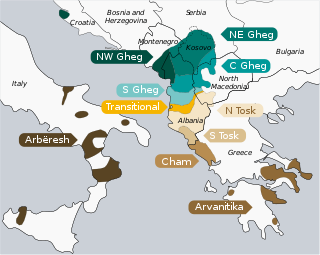
Albanian is an Indo-European language and branch, which belongs to the Paleo-Balkan group. Standard Albanian is the official language of Albania and Kosovo, and a co-official language in North Macedonia and Montenegro, as well as a recognized minority language of Italy, Croatia, Romania and Serbia. It is also spoken in Greece and by the Albanian diaspora, which is generally concentrated in the Americas, Europe and Oceania. With perhaps as many as 7.5 million speakers, it comprises an independent branch within the Indo-European languages and is not closely related to any other modern language.

Relations between Albania and Serbia have been complex and largely unfriendly due to a number of historical and political events.

An incident took place on the Albania–Yugoslav border in April 1999 when the Yugoslav Army shelled several Albanian border towns around Krumë, Tropojë. In these villages, refugees were being housed after fleeing the ongoing war in Kosovo by crossing into Albania. On 13 April 1999, Yugoslav infantry entered Albanian territory to close off an area that was used by the KLA to stage attacks against Yugoslav targets.